Susan Rich's Blog, page 33
September 22, 2013
Long Listed for National Book Award: Congratulations to Lucie Brock-Broido
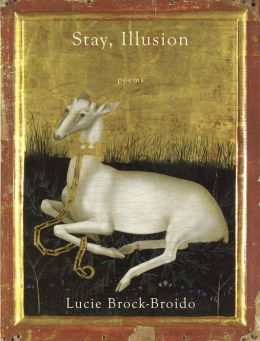 Poems by Lucie Brock-BroidoI am a lover of the long, strange, and grandiose title. And so, it seems, is Ms. Brock-Broido. My favorite examples of this in her new book Stay, Illusion are "You Have Harnessed Yourself Ridiculously to This World" and "Considering the Possible Music of Your Hair."
Poems by Lucie Brock-BroidoI am a lover of the long, strange, and grandiose title. And so, it seems, is Ms. Brock-Broido. My favorite examples of this in her new book Stay, Illusion are "You Have Harnessed Yourself Ridiculously to This World" and "Considering the Possible Music of Your Hair."This summer I was sent an advance copy of Stay, Illusion to review and consequently spent much of August carrying the beautiful book with me and making comments in the margins as I stopped at red lights or took the collection out for coffee. Along the way I learned that "dirndl" is a traditional German skirt or dress and that I really need to read Kafka's Blue Octavo Notebooks.
More than this, I found myself drawn again and again to the scaffolding of the poems, to the long lines both intimate and faraway at once. In these lines the beloved is close and the language paired down. These are some of my favorite lines in the book.
Cloak of many blankets wounding you to warmth. It was not,
We both agreed, the time for hospital, its open sea of urgent
Care. Close your eyes and try to sleep. Underwater the music
Of your hair is glossy even now, willowing in currents, away
From our island rancid with the spring.
Not much longer now.
Green length of one hour, all the blood rushing to the places it will
Not be needed anymore. Now no longer now.
from "Considering the Possible Music of Your Hair"
The collection's title references a line from "Hamlet" and it is a tad unclear to this reader whether the loss of the father and the aftermath of the world without him is a perfect analogy for this book. Certainly the narrator of these poems is self-obsessed and as with Hamlet's youthful narcissism, we are drawn into their struggles.
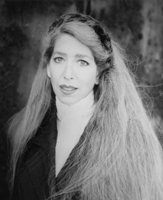 Lucy Brock-BroidoFinally, it is the the sense of a mind looking back on its life in the presence of death that interests me most. The language is paired down to particulars and with an urgency to speak.
Lucy Brock-BroidoFinally, it is the the sense of a mind looking back on its life in the presence of death that interests me most. The language is paired down to particulars and with an urgency to speak.However, one troubled orientation of the book is the constant references to "Jews" in a rather Shakespearean fashion. I find this troubling from the first poem onwards:
On the tunic of a Jew, preventing more bad biological accidents
From breeding in. I have not bred-
In.
from "Infinite Riches in the Smallest Room"
I do not know Ms. Brock-Broido and so perhaps these references would make more sense if I did.
This is a book that I would recommend for poets interested in structure and surprise --- which I believe is most of us. It is a book that kept me company in late summer and my writing and thinking were the better for it.
Published on September 22, 2013 17:45
September 15, 2013
Kelly Davio as This Week's Poet at Poet At Your Table
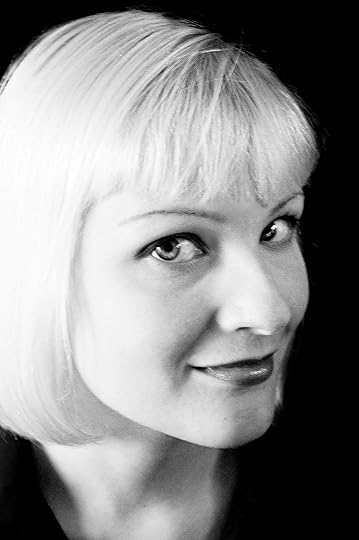 Poet Kelly Davio
Poet Kelly Davio
I first met Kelly Davio a few months ago after she had joined our BookLifters group. Her positive spirit and upbeat personality would be an asset to any Northwest table. Kelly's first book came out this past spring and is already garnering much deserved attention.
For more information on inviting Kelly to your table --- or any of our poets --- please write to "poetatyourtable(at)gmail.com You can also check out our web page right here.
BURN THIS HOUSE BY KELLY DAVIO
Helen Taylor wrote the hymn “Bless This House” in 1927. It begins, “Bless this house, O Lord we pray. Make it safe by night and day. Bless these walls so firm and stout, keeping want and trouble out. Bless the roof and chimneys tall. Let thy peace lie overall.” Open any church hymnal and you will find its familiar words and tune. Enter any home and you might find the title printed or embroidered or cross-stitched and hanging on the wall. So, when Kelly Davio titles her first collection Burn This House, I know she means business. Business with tradition, with family, with the God who is called upon to bless and protect what might more rightfully be torched.
The first poem in the collection sets Davio’s mission and tone. The end of the poem asks, “To what / significance such eroded things?” This seems to be the question at the heart of the book, one that the speakers struggle to answer in different ways. Davio explores the erosion of faith, time, memory, and love with clear speakers who are unafraid to expose doubts and question the world. The speakers are alternately compassionate and cruel, ironic and sincere. They speak in poems that sometimes pin us down like an older brother until we call uncle or whisper soft doubts into our ears, making us question our own mothers.
Continue reading The Rumpus review right here
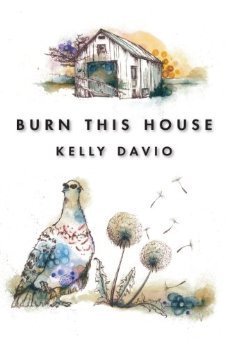
Sympathy
With great wrestlings have I wrestled with my sister.
—Genesis 30:8
Rachel and Leah on a blue flannelgraph,
paper limbs clinging to fiber and shadow,
the edges of their arms overlapped, hand
holding hand. Sisters: their photocopied faces
told us so.
We two sat on the church room floor,
handling our cotton-ball sheep, all paste
and stringy wool, my lamb’s eyes drooping.
Your fingers crept out to grab at my sheep—
I slapped your hand away.
The Sunday school teacher plucked Rachel
form the board, tucked her behind Jacob’s tent.
The ball of her foot peeked beneath canvass,
suggesting the turn of a dance. Jacob loved Rachel,
but he hated Leah.
We thought we knew the meaning, then,
of the pair of sisters: one would be loved.
The other would stand outside the tent,
her paper arm extended, hand empty.
We eyed one another,
each certain that we would be the heroine
of our own myth, each the one to dance in the tent.
The way your face went hard told me that you
would leave me standing in the dust.
But we didn’t know—
Leah: from the Akkadian, meaning cow.
Meaning the one with the swollen eyes, her body
used to plow the fields, arms dragging a furrow
through soil and rock to feed the sons
born to her sister.
Rachel: from the Hebrew, meaning ewe.
Meaning the one used as sacrifice, the one
filleted, chopped, stewed for a meal.
The one stripped naked to clothe the sons
that weren’t her own.
Neither the victor, neither one loved.
Both chattel to a wandering shepherd,
wrestling over crusts of bread. We didn’t know
that a tent’s flap folds the way the body bends
to breaking.
Kelly Davio
For more information on inviting Kelly to your table --- or any of our poets --- please write to "poetatyourtable(at)gmail.com You can also check out our web page right here.
Published on September 15, 2013 20:09
September 13, 2013
Do Poets Still Write Letters? Some Do!
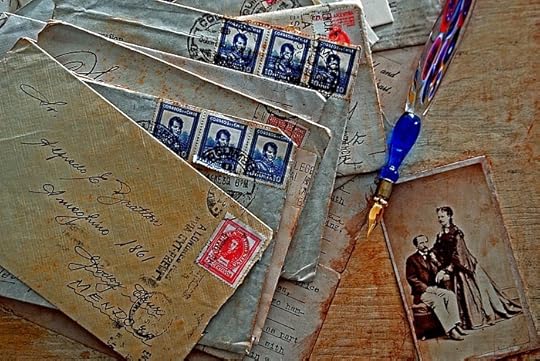 The Beauty of the LetterOne very cold and wet December, Jordan Hart asked Kelli Russell Agodon and me to write a series of letters about poetry, friendship, and the writing life. The idea was that perhaps our experiences would be of use to other poets and writers. It was one of our favorite assignments and took place the same week we decided to start Poets on the Coast.
The Beauty of the LetterOne very cold and wet December, Jordan Hart asked Kelli Russell Agodon and me to write a series of letters about poetry, friendship, and the writing life. The idea was that perhaps our experiences would be of use to other poets and writers. It was one of our favorite assignments and took place the same week we decided to start Poets on the Coast.What the letters don't mention is that we are both writing from separate cottages at a northwest artist residency as we wrote. This gave us the space to reflect on our 10+ years of friendship.
I am a great fan of literary letters from Elizabeth Bishop and Paul Celan, to Denise Levertov and Rainier Maria Rilke. If you have a dear poet friend you might try doing this with her (or him).
A few months ago we asked two of the most popular writing teachers at the Port Townsend Writers' Conference–Kelli Russell Agodon and Susan Rich–to let us "eavesdrop" on their musings of their friendship, their poetic passions, and their lives as writers in the Pacific Northwest. What follows is a conversation held over email on the nature of their friendship and what it has come to mean to them–and to their work–over the past ten years.
Dear Kelli,
Here is the secret nobody knows: poets need friends. OK. You know it, I know it, and so did Elizabeth Bishop. From Brooklyn over the Brooklyn Bridge this fine morning please come flying. In “Invitation to Miss Marianne Moore,” Elizabeth Bishop celebrates her deep friendship with another woman poet: her mentor and lifelong friend, Marianne Moore.
I know that Bishop and Moore shared poems, went on outings to the zoo together, and when Bishop moved to Brazil in 1951, wrote long letters. Our friendship, now almost a decade old, impacts my writing life in important and magical ways. Do you remember when we first met? We both had poems for the Poetry on the Busses anthology and were reading at the Seattle Art Museum. Your daughter, an infant at the time, let out an enormous cry when you took the podium. “That’s my daughter,” you said without missing a beat.
I liked you right from the start, but it probably took your organizing a reading for Poets for Peace for us to see each other again. I didn’t realize until right now that our friendship was connected to the aftermath of September 11th — and the need for poets to come together and speak out against the witch-hunt mentality of that moment. That you brought so many poets together — anyone in Seattle who wanted to join us, it seemed — at such an uncertain time gave me a strong sense that you were someone I needed to know better.
I’m pretty sure that I was the one who asked you out first. We met at Elliott Bay Books, the old location. You had on a cream-colored rain coat, tied at the waist and looked every bit the stylish writer. I remember asking you about whether poets should publish in online journals. This was an actual question at the time. Yes, you know you were in favor. From the beginning of our friendship you have been my technology guru. I don’t know if this is due to the age difference between us or the fact that you are more willing to dive into the unknown. Of course, I’ve flown off to live in Africa or to do human rights work in Bosnia and Gaza, while you’ve lived your entire life in the Northwest. Our life experiences have been very different and yet there’s some core substance that connects us together. I can’t say exactly what it is but I know it has to do with ideas about friendship and poetry.
To continue reading our literary letters click here!
Published on September 13, 2013 12:46
September 11, 2013
For September 11th
Photograph of September 11
Wislawa Szymborska
They jumped from the burning floors—
one, two, a few more,
higher, lower.
The photograph halted them in life,
and now keeps them
above the earth toward the earth.
Each is still complete,
with a particular face
and blood well hidden.
There’s enough time
for hair to come loose,
for keys and coins
to fall from pockets.
They’re still within the air’s reach,
within the compass of places
that have just now opened.
I can do only two things for them—
describe this flight
and not add a last line.
--Monologue of a Dog
Published on September 11, 2013 09:14
September 10, 2013
Kathleen Flenniken Wins Washington State Poetry Award 2013

Congratulations to Kathleen Flenniken winner of this year's Washington State Book Award in Poetry. So well deserved! PLUME is a gorgeous and important book.
Published on September 10, 2013 09:49
September 4, 2013
The Beauty of the Chapbook: Alluring and Real
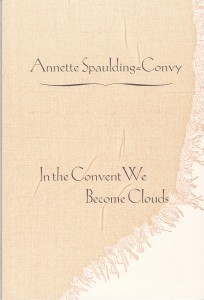 Beautiful Chapbook by Annette Spaulding-Convy
Beautiful Chapbook by Annette Spaulding-ConvyAs I prepare to co-teach a workshop on From Manuscript into Book, I wanted to share this post by Erica Mena (thank you to Angie Vorhies for sharing this with me) about the allure of the chapbook. Erica offers a wonderful meditation on the often handmade and fleeting nature of the chapbook (it can be hard to find in bookstores --- unless you live in Seattle).
Mena also mentions a chapbook/zine membership. If you are considering publishing a chapbook it is absolutely necessary that you see, touch, and feel the other chapbooks the publisher has made.
My absolute favorite chapbook press for poets is in Washington State Floating Bridge Press now sporting a snappy new website. Annette Spaulding-Convy won the Floating Bridge Chapbook Award several years ago. In both form and content, this is my favorite chapbook. It is brilliantly ordered and in one sitting takes you into a world of convents and compassion.
Here's the opening of Erica Mena's post:
**I drafted this post a few weeks ago, and wanted to have more in my spreadsheet before publishing, but CLMP just announced a new chapbook/zine membership which you can read about here and I figured I should just get this posted.**
I’ve been into chapbooks for a long time. Pretty much since I started working in literary publishing as the senior editor for the fascinating Arrowsmith Press, edited by Askold Melnyczuk. There’s a lot to love about them. One of the things I love most about chapbooks is their size – just long enough to seriously engage with, but short enough to read in one sitting. The brevity of the form leads to books that cohere in a more satisfying way to me than many full-length collections do. Especially in poetry, but I think also in cross-genre, short-fiction and the literary essay. I think of a chapbook like a really great album (ok, now I sound old, but I worked in a music store for a while, and yeah, it was sort of like Empire Records). A great chapbook, like a great album that has an arc to it, a movement, thoughtfulness, even perhaps an argument (implicit or explicit). Where a lot of full-length collections are more like a best-of, or a comprehensive catalog, a chapbook can establish an internal poetics and logic that is often impossible for longer works.
Another thing I love about the chapbook is the ephemeral quality of it, as a physical object. A lot of chapbooks are small, handmade objects that are out of place in bookstores. I can only think of a handful of bookstores that even consider carrying chapbooks, and even then they are sort of hard to spot, as spineless as they often are. Of course, that’s usually enough to intrigue me when I’m browsing, but I imagine they get overlooked more often than not. They’re often made in extremely limited editions,
To read the rest of this wonderful article go to Erica Mena's wonderful website Alluringly Short.com
Published on September 04, 2013 09:51
September 1, 2013
Add Another Poet to A Poet At Your Table: Katharine Whitcomb
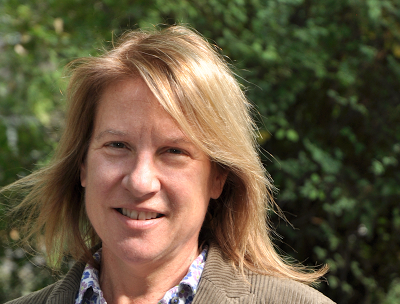 Katharine WhitcombPoet at Your Table Katharine Whitcomb and I first met through her poetry. Whitcomb won the Floating Bridge Press prize for Lamp of Letters --- a book I completely adore. When I heard her read at her book launch, I knew that this was someone I wanted to befriend. I love how a deep sharing of words can bring people into our lives. It's Katherine's poetry that connected me to her.
Katharine WhitcombPoet at Your Table Katharine Whitcomb and I first met through her poetry. Whitcomb won the Floating Bridge Press prize for Lamp of Letters --- a book I completely adore. When I heard her read at her book launch, I knew that this was someone I wanted to befriend. I love how a deep sharing of words can bring people into our lives. It's Katherine's poetry that connected me to her.Katharine Whitcomb teaches at Central Washington University and is the Coordinator of the English Writing Specialization Program. She is available to visit book groups in Central Washington or in the Seattle area.
For more information on inviting Katharine to your table please write to "poetatyourtable(at)gmail.com You can also check out our web page right here.
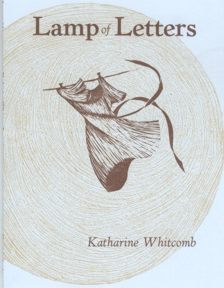
Animal Heaven
As if diving from a dock the dogs leapt off a railroad bed
today over the sunken hayfield. They plunged
into the wake of grass, gold one, black one, and disappeared,
reappeared in the breaking green troughs, at a run.
Now here we are. Our tall bedroom sways;
frigate ship steered by gravity. Your arms reach to soothe
me when I wake shaken from a nightmare, another long chase
to the horizon—the dogs breathe with calm huffs and woofs.
Soft eyes closed, the golden’s paws move like heron’s
wings in the west pasture, undulating muscular bounds.
Through the tall grass heaving with the bosomy wind of June,
sleep lowers us. With garments undone our love eases down
to the valley floor. The dogs swim one before, one
after. All this beauty! in waves, then oblivion.
You can also listen to Katharine Whitcomb read her poem Murder Mystery on KUOW in an interview with fellow poet, Elizabeth Austen.
Published on September 01, 2013 19:38
August 30, 2013
A Sad Day for Poetry: Seamus Heaney Dies at 74
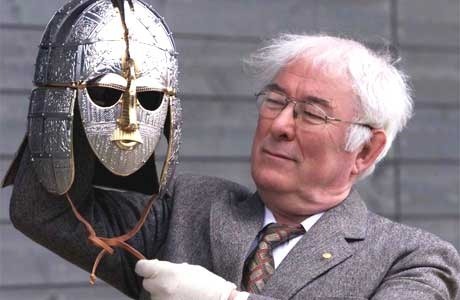 Seamus Heaney At PlayI am shocked and saddened by the The New York Times story announcing Seamus Heaney's death after a short illness. Once upon a time we were neighbors as he lived half the year in Adams House in Harvard Square. I believe I have all but one of his books and that is many many books. More about his life and loves to come.
Seamus Heaney At PlayI am shocked and saddened by the The New York Times story announcing Seamus Heaney's death after a short illness. Once upon a time we were neighbors as he lived half the year in Adams House in Harvard Square. I believe I have all but one of his books and that is many many books. More about his life and loves to come.Far Away
When I answered that I came from “far away”
The policeman at the roadblock snapped “where’s that”?
He’d only half heard what I said and thought
It was the name of some place up the country.
And now it is both where I have been living
And where I left --- a distance still to go
Like starlight that is light years on the go
From faraway and takes light years returning.
Seamus Heaney
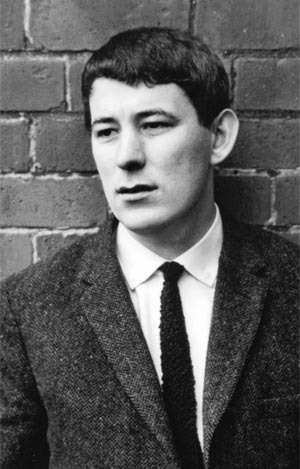
“The main thing is to write for the joy of it. Cultivate a work-lust that imagines its haven like your hands at night, dreaming the sun in the sunspot of a breast. You are fasted now, light-headed, dangerous. Take off from here. And don’t be so earnest.”
Published on August 30, 2013 07:55
August 29, 2013
Poetry of the Wild, Weathered Pages, and the Improbable Places Poetry Tour Means Poetry is Alive
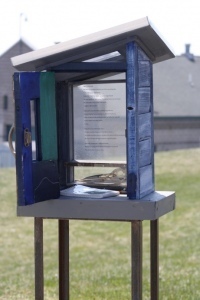 Poetry Box and Poem by Ana FloresI've been wanting to explore the intersection of poetry and art for awhile. Perhaps this is my new love: the overlapping of poetry with sculpture, painting, and performance.
Poetry Box and Poem by Ana FloresI've been wanting to explore the intersection of poetry and art for awhile. Perhaps this is my new love: the overlapping of poetry with sculpture, painting, and performance.This is a subject that my forthcoming book Cloud Pharmacy will explore and until then, I'll blog about different projects I come across that blend poetry and the visual arts or performance or seem to create something new altogether.
The Improbable Places Poetry Tour + 1 is a project in Seattle, WA that takes its inspiration from Colleen Michaels who lives on the North Shore of Massachusetts. Colleen works at Montserrat Art College and along with her students, organizes the Improbable Places Poetry Tour in places as improbable as a laundry mat, flower shop, and auto mechanic's garage. The evening features local poets that write on the theme of the space and there's also an open mike. After several years of phenomenal success, Colleen is in the enviable position of having local businesses contact her. The events bring local businesses, students, and community people together all in the name of poetry. How cool is that?
Perhaps there is something in the waters off Massachusetts because Ana Flores' work also comes from my home state. However, her work is also in many other states as well. Recently, Poets and Writers featured an article on the poetry boxes that Anna creates and then places out in the wild and in public spaces.
Finally, Weathered Pages is as simple an idea as it is elegant. In Yakima, WA a pole on Dan Peters road invited poets to post their work or just to stop by and read a poem. Poets from all over the country and the world came by and shared their work. The result is that Blue Begonia Press has now created an anthology of this work--- before the rain washes it away.
Published on August 29, 2013 23:41
August 28, 2013
Know the Signs...
 Encourage Everyone to Try ItThis comes to you from Russell Jones, a poet, editor, researcher, and tutor who lives in Edinburgh, Scotland. I love how the web connects us all --- he says that although he's edited books and published poetry collections, this may well be his most popular publication. I encourage you to take a look at his work right here.
Encourage Everyone to Try ItThis comes to you from Russell Jones, a poet, editor, researcher, and tutor who lives in Edinburgh, Scotland. I love how the web connects us all --- he says that although he's edited books and published poetry collections, this may well be his most popular publication. I encourage you to take a look at his work right here.
Published on August 28, 2013 11:58



